Politics
Turkish opposition’s CHP confirms joining terror-free initiative
The main opposition Republican People’s Party (CHP) has confirmed it would participate in the parliamentary committee tasked with overseeing the dissolution of the PKK terrorist group under the terror-free Türkiye initiative.
The names of the 10 CHP lawmakers who will join the committee will be announced Thursday, Turkish media reported Wednesday.
“The CHP will stay in the committee if it’s making progress,” CHP Chair Özgür Özel said in an interview with a Turkish news outlet on Tuesday.
In May, the PKK, blacklisted as a terrorist group by Türkiye, the U.S., the U.K. and the EU, announced its dissolution and the end of its four-decade terror campaign that cost tens of thousands of lives in Türkiye, as well as in Iraq and Syria.
Most recently, in a ceremony across the border in Iraq earlier this month, PKK members destroyed their weapons as part of the process. Turkish intelligence monitors the process, while Parliament will form a committee to weigh next steps in the initiative, from the fate of disarmed PKK members to their sentencing.
The committee will comprise 51 parliamentarians. The ruling Justice and Development Party (AK Party) will be represented by 21 members; its ally, the Nationalist Movement Party (MHP), and the Peoples’ Equality and Democracy Party (DEM) will contribute four lawmakers each, media outlets reported over the weekend. Reports say the committee would be eligible to suggest draft bills if 31 lawmakers approve it.
“Sometimes there are critical turning points in history. It’s important to be on the right side of history. Not entering any lawmakers into the committee under the current circumstances would waste the historical consistency of the CHP,” Özel argued.
“The committee is actually a judicial commission. Seven of our lawmakers in that commission are legal experts. Politicians, too, will be in that committee. It will include people who represent all of Türkiye,” he said.
Özel, however, insisted on the CHP’s condition for “equal representation” in the committee.
The committee’s work will concentrate on the state of PKK terrorists who abandoned arms and those who were incarcerated for aiding and abetting the PKK. The PKK is still regarded as a terrorist group, and the committee will likely debate about its future status once the group fully abandons arms.
Along with major parties, smaller ones have also agreed to contribute to the committee, and they are required to declare the names of their lawmakers to the head of Parliament by Thursday.
Parliament Speaker Numan Kurtulmuş will chair the committee but will not be eligible for voting on its decisions. The committee, the only one operating at the Parliament, which recently began its summer recess, will convene four times weekly at most and will debate reports presented by intelligence and security units monitoring the PKK’s disarmament.
Media reports indicate that the committee will chart a roadmap for the initiative and discuss regulations and amendments to accelerate it, including those similar to the “Homecoming Law” implemented in 2003, which offered lenient sentences for PKK members not involved in terror attacks. The committee’s work will serve as a guideline for future bills on terrorism.
Far-right parties are skeptical of the initiative and even outright hostile to efforts to end terrorism. Among them are the Good Party (IP) and the Victory Party (ZP), which heavily criticized the initiative. The IP shunned the parliamentary committee and will stage rallies across Türkiye in August.
Addressing an event in the western province of Çanakkale on Sunday, Kurtulmuş stated that the committee would oversee the initiative and take steps to implement any necessary political and legal regulations to advance it further.
Meanwhile, on Wednesday, MHP lawmaker Feti Yıldız, after meeting with MHP leader Devlet Bahçeli, described the committee as a “brotherhood and solidarity committee” in a post on X, stoking media reports that the MHP is suggesting a brand-new campaign for the assembly.
In response to the claims, Yıldız, in a following post, said the committee’s name remains “national unity and solidarity committee,” dismissing reports as a “futile attempt to fuel debates through the committee’s title.”
Politics
Erdoğan, Meloni, Dbeibah hold trilateral summit in Istanbul
President Recep Tayyip Erdoğan on Friday received Italian Prime Minister Giorgia Meloni and Libyan Prime Minister Abdul Hamid Mohammed Dbeibah in Istanbul for a cooperation summit.
The surprise meeting at Dolmabahçe Palace on the banks of the Bosporus focused on energy exploration in the Mediterranean, irregular migration flows, as well as the political process to restore stability in Libya, media reports said.
The summit is “part of the ongoing coordination between Libya, Türkiye and Italy, aimed at promoting common approaches that serve the interests of the region’s peoples and contribute to supporting stability and international cooperation, according to a statement released by the Libyan Government of National Accord (GNA).
In June 2025, Türkiye and Libya signed a deal for joint geological and geophysical surveys across four offshore Mediterranean zones. The agreement includes a 10,000‑kilometer (6,200-mile) seismic campaign and data processing within nine months, signaling a strategic deepening of Ankara‑Tripoli ties in hydrocarbons.
Türkiye’s expertise and seismic capabilities are set to play a pivotal role in unlocking Libya’s untapped reserves, estimated among Africa’s largest, while Italy remains a key downstream partner through pipelines like Greenstream linking Libya to Sicily.
The talks also came against the backdrop of mounting migration pressures, as all three nations sit along key routes into the European Union for people fleeing war and poverty. Libya remains the primary departure point, with some 21,000 migrants reaching Italy this year – an 80% increase compared to 2024, according to Italian daily Il Sole 24 Ore.
As two NATO allies, Türkiye and Italy have strengthened their partnership in recent years, playing complementary roles as regional bridge-builders. Cooperation has expanded in trade, defense and diplomacy, with both nations prioritizing stability in the Black Sea, the Middle East and North Africa.
Earlier this year, Italian defense giant Leonardo, one of Europe’s largest defense industry companies, and Turkish drone powerhouse Baykar signed a cooperation agreement, highlighting their interest in intensifying defense cooperation.
Diplomatic engagements have increased, with Erdoğan and Meloni holding frequent phone discussions. In the Black Sea and the Middle East, Türkiye’s mediation efforts for the wars in Ukraine and Gaza align with Italy’s priorities for regional stability.
Erdoğan last visited Rome in late April for the fourth intergovernmental summit between the two countries. He and Meloni discussed geopolitical crises, as well as the present and future of Libya.
In a joint declaration, the sides had voiced their support for a U.N.-facilitated, Libyan-owned political process aimed at preserving Libya’s unity, security and sovereignty.
Türkiye’s role in Libya
Libya has seen more than a decade of stop-start conflict since a NATO-backed revolt toppled longtime dictator Moammar Gadhafi in 2011, with a myriad of militias forming opposing alliances backed by foreign powers.
The country is currently governed by two rival administrations: the U.N.-recognized GNU led by Dbeibah in Tripoli, which controls the western part of the country, and the government of Osama Hammad, appointed by the parliament, which operates out of Benghazi and governs the eastern region and parts of the south.
Efforts led by the U.N. to hold parliamentary and presidential elections have repeatedly stalled, prolonging the country’s political deadlock and exacerbating the security situation in the oil-rich nation.
Türkiye and Libya have seen closer ties in recent years, especially after the signing of security and maritime boundary pacts in November 2019, along with Türkiye’s aid to help the internationally recognized Libyan government push back putschist Gen. Khalifa Haftar’s forces.
Türkiye supported the U.N.-recognized legitimate government in Tripoli against the eastern-based illegitimate forces led by Haftar, who was backed by Egypt, France, the United Arab Emirates (UAE) and Russia.
Türkiye’s support for the Tripoli government was critical in repelling the Haftar forces’ offensive to capture the capital, Tripoli, and led to a period of stability that resulted in the formation of a unity government.
Politics
Istanbul to host next year’s inter-parliamentary assembly
Istanbul will host the 152nd Assembly of the Inter-Parliamentary Union (IPU) next year, Parliament Speaker Numan Kurtulmuş announced during a press briefing at the U.N.’s Geneva headquarters.
“It will be a great honor for us, as Türkiye, to have these people, the parliamentarians around the world, in Istanbul,” Kurtulmuş said Wednesday, confirming that the hosting agreement had just been signed.
The announcement came during an Association of Accredited Correspondents at the United Nations news briefing in Geneva, where Kurtulmuş was attending this week’s Sixth World Conference of Speakers of Parliament, organized by the IPU.
The IPU’s 151st Assembly will also take place in Geneva on Oct. 19-23 with the theme of upholding humanitarian norms and supporting humanitarian action in times of crisis.
Gaza genocide
At the briefing, Kurtulmuş described Israel’s actions in Gaza as “the biggest genocide in modern times.”
He accused Israel of deliberately using famine as a weapon and criticized the international community, particularly the U.N., for its failure to act.
“We are gathered at the U.N. facility premises today, and I’d like to ask, where is the United Nations today?” he said. “If they cannot prevent the danger of 40,000 babies dying due to hunger, then what good are they for?”
Calling for immediate international intervention, he added: “The most immediate action that is needed today is stopping Israel as soon as possible.”
He also pointed to a growing shift in the global political landscape, noting that even countries traditionally supportive of Israel are beginning to change their stance.
“Even those countries that so far always appeared to provide support to Israel in an unquestionable way, that have sided with Israel with no questions asked, started to say that ‘what you are doing in Gaza is a genocide, you have to end it, and if you do not end it, then we will recognize Palestine,'” he said.
Taking a question from Anadolu Agency (AA), Kurtulmuş elaborated on Türkiye’s effort to build a global parliamentary platform, the Group of Parliaments in Support of Palestine.
He said they had invited all national parliaments to join the initiative during the parliament speakers’ meeting this week.
The initiative held its first meeting in Istanbul, and according to Kurtulmuş, it was “quite fruitful” thanks to in-depth discussions.
Kurtulmuş expressed hope that the platform would expand beyond Muslim or Middle Eastern countries to include parliaments from Europe, Latin America, Africa and Asia.
He added that the “common voice that is rising on the streets, reflecting the beliefs of humanity,” should also be reflected in legislative bodies, emphasizing that there is “a lot to do in this regard.”
Additionally, he noted that Israel’s military campaign extends far beyond Gaza and accused it of violating the sovereignty of multiple neighboring countries.
“They have bombarded Lebanon so far. They have bombarded Yemen so far, Syria also, Iran also,” he said. “But no matter how aggressive they are or how they act, I believe they are wise enough not to mess with Türkiye.”
He said Israel’s actions reflect a long-term ambition to divide and destabilize the region under the so-called “Promised Land” doctrine and that global public opinion is increasingly turning against these efforts, even in countries that have long supported Israel.
Russia-Ukraine talks
On the war in Ukraine, Kurtulmuş stressed that Türkiye has maintained communication with both Kyiv and Moscow from the very beginning and continues to pursue shuttle diplomacy between the two sides.
“Since the beginning of this war, Türkiye has always been one of the rare countries in the world that was able to maintain dialogue with both countries,” he said.
He told how delegations from Russia and Ukraine came together in Istanbul in March 2022 – just after the war started – and signed a draft agreement but were ultimately unable to finalize it.
“When the time came for them to sign the actual final peace agreement, they were not able to settle in peace, since certain countries did not side with peace and they wanted the process to continue,” said Kurtulmuş.
Kurtulmuş underlined that Türkiye believes a resolution is only possible through direct talks that produce a “fair and acceptable” peace.
“The way to peace is a fair one, not an imposed one,” he said, adding that Türkiye had continued its efforts through three more meetings in Istanbul since this June.
He voiced hope that a fourth round of talks would bring presidents Volodymyr Zelenskyy of Ukraine and Vladimir Putin of Russia to Istanbul to “pave the way for a permanent peace between the two nations.”
“Personally, speaking, I am rather optimistic in this regard, because every war comes to an end, every conflict comes to an end … and no matter what happens, there are no winners in wars, and it’s the people, it’s the nations that lose all the time due to wars and due to conflicts.”
The parliament speaker also criticized Western sanctions on Russia.
“Blockades and embargoes never prevail and never yield results … these kinds of practices do not stop the regimes or do not penalize the regimes. Instead, they penalize the civilians, the people.”
On Syria, he called for a political solution that guarantees the rights of all ethnic and religious groups and safeguards the country’s territorial integrity.
“People coming from different backgrounds in Syria should be able to gather under one single flag and act as members of this one single nation,” he said, warning against both internal remnants of the ousted Bashar Assad regime and foreign interference that threaten to undermine stability.
Istanbul as peace hub
Kurtulmuş said Türkiye’s neutral stance had helped make Istanbul a hub for international negotiations, not only on Ukraine but also on other global conflicts.
“We are quite pleased to see that Istanbul is becoming a center of negotiations,” he said. “This is thanks to the neutral and structuring role that Türkiye is assuming so far.”
He underlined the unique role of parliaments in diplomacy, saying legislative channels can act more flexibly than governments in promoting peace.
“Parliaments are more advantageous to make progress in peace talks,” he said, noting active dialogue with both the Ukrainian and Russian Parliaments.
Kurtulmuş also said rising global awareness – both on the streets and in legislative institutions – could help shift the balance toward justice and lasting peace.
Politics
Parties unveil members for key committee on terror-free Türkiye
Ahead of its formal inauguration, a parliamentary committee on the terror-free Türkiye initiative is taking shape.
The Republican People’s Party (CHP) and the Justice and Development Party (AK Party) on Thursday announced the names of their parliamentarians who will join the committee.
The committee is expected to begin work next week and will address the multiple aspects of the initiative that have been discussed so far through statements from politicians. The first concrete step in the initiative, which involves disarmament of the PKK terrorist group, came earlier this month when a group of terrorists burned their weapons in a symbolic ceremony. Although a symbolic gesture, it is expected to gain momentum in the coming months and end decades of violence that claimed tens of thousands of lives.
Media outlets reported that the CHP’s committee members will include Deputy Parliamentary Group Chair Murat Emir, Deputy Chairs Gökçe Gökçen and Murat Bakan and lawmakers from Istanbul, Diyarbakır, Ankara and Muğla. Among them are Türkan Elçi, the widow of Diyarbakır Bar Association’s former Chair Tahir Elçi, who died in 2015 in crossfire during a shootout between police officers and PKK members and Sezgin Tanrıkulu, a prominent parliamentarian who has often made headlines for his heavy criticism of counterterrorism efforts.
The CHP supports the terror-free Türkiye initiative, though it criticizes many aspects of the process. Party Chair Özgür Özel said earlier that they would join the committee if it applies “qualified majority” rule and their condition appears to be accommodated. Other parties that have confirmed their intention to join the committee are the Labour Party (TIP) and the Democratic Left Party (DSP). The Nationalist Movement Party (MHP) had already announced its lawmakers for the committee, around the same time that the Peoples’ Equality and Democracy Party (DEM Party) unveiled its list of lawmakers. The MHP launched the terror-free Türkiye initiative last year when its leader Devlet Bahçeli called on PKK’s jailed ringleader Abdullah Öcalan to urge his group to lay down arms. Öcalan agreed and the PKK declared its dissolution last May before it started abandoning arms earlier this month. The DEM Party, known for its intricate links with the PKK, played a key role in the initiative, serving as messenger between Öcalan and political parties during visits to the PKK leader, party leaders and President Recep Tayyip Erdoğan.
The AK Party’s parliamentary group chair, Abdullah Güler, announced the names of their 21 committee members as they presented the list to the office of the Parliament speaker on Thursday. Among AK Party lawmakers who will serve on the committee are former Justice Minister Abdulhamit Gül, Mustafa Şen, Kürşat Zorlu, Hüseyin Yayman, Cüneyt Yüksel, Sunay Karamık, Selami Altınok, Kemal Çelik, Mehmet Sait Yaz, Mahmut Atilla Kaya, Şengül Karslı, Mehmet Şahin, Ayşe Böhürler, Radiye Sezer Katırcıoğlu, Tahir Akyürek, Ali Kıratlı, Cevahir Asuman Yazmacı, Gökhan Diktaş, Burhan Kayatürk, Abdurrahman Babacan and Ersan Aksu. Yüksel is a prominent academic who taught law before joining Parliament and already heads a parliamentary delegation representing Türkiye in international courts in the country’s efforts to hold Israel accountable for its war crimes in Gaza. The AK Party’s list is diverse in terms of constituency, containing lawmakers from all regions of Türkiye, including southeastern Türkiye, which has heavily suffered from PKK attacks for decades.
The Free Cause Party (HÜDA-PAR), which endorsed President Erdoğan in the 2023 presidential elections, announced that its chair, Zekeriya Yapıcıoğlu, will serve as a committee member, while the New Path (YY), an alliance of three smaller political parties that pursue right-wing policies, presented the list of three lawmakers to represent them at the committee on Thursday.
Speaking to reporters on Wednesday, Parliament Speaker Numan Kurtulmuş, who will chair the committee, said it would begin work in the first week of August and would operate in a manner that ensures all parties have a say in the process. Kurtulmuş confirmed the qualified majority rule for the decisions of the committee. He noted that the initiative had now passed to Parliament as disarmament began.
“Now we have to move forward very sensitively,” he said.
He said the committee would draft several legal regulations based on the needs of the initiative. “One of the most important issues here is maintaining transparency in the committee’s work, heeding public concerns. The golden ratio for us, the balance of this work is prioritizing the dignity of Turks and the pride of Turks,” he said.
Proponents of the initiative often stress Turkish-Kurdish unity to counter the terrorism threat, as the PKK long exploited Kurds to draw support for its so-called cause to carve out an autonomous region for the community in the southeast. Kurtulmuş stated that the committee would hear “many people.”
“We will hear from nongovernmental organizations, jurists and everyone who studied this and has a stake in this. It will not be a political entity. This is an initiative involving the entire nation and efforts to eradicate the most important problem in the history of the republic,” he said.
He also stated that the committee would draft bills and present them to Parliament’s general assembly, which will then decide on whether to pass them.
Politics
Sweeping corruption, terrorism probes shake CHP-run municipalities
The main opposition Republican People’s Party (CHP) is under mounting scrutiny as a wave of corruption, bribery and terrorism-related investigations sweep across its municipalities.
Since late 2024, more than 500 people, including some 15 sitting mayors, have been detained in police operations. Over 200 have been formally arrested while dozens benefited from the legal provision of “effective remorse” in exchange for cooperation with prosecutors.
Authorities say more than 10 major investigations are underway into municipalities controlled by the main opposition CHP, covering allegations from large-scale tender rigging and bribery to financing terrorist organizations.
The most extensive probe targets the Istanbul Metropolitan Municipality (IBB), led by ousted mayor Ekrem Imamoğlu, over claims of systematic corruption, fictitious tenders and abuse of public resources. Prosecutors allege a network, headed by senior municipal officials, rigged numerous public contracts. Imamoğlu and his aides deny all charges.
Linked to these allegations is the case of businessperson Aziz Ihsan Aktaş, accused of heading a criminal network that allegedly bribed mayors and senior officials to secure lucrative tenders. Aktaş, initially arrested, was later released after cooperating with authorities under effective remorse provisions.
Terrorism-linked probes
Two separate investigations in Istanbul focus on alleged links between CHP district municipalities and the PKK terrorist organization. Police operations earlier this year targeted nine CHP-run districts, leading to the arrests of deputy mayors and council members. Prosecutors claim certain local initiatives were used to bolster PKK influence in major cities.
In another high-profile case, dismissed Esenyurt Mayor Ahmet Özer faces trial on charges of PKK membership, while former Sarıyer Mayor Şükrü Genç is accused of financing the DHKP-C terrorist group through municipal channels.
Corruption in and beyond Istanbul
The corruption allegations extend far beyond Türkiye’s largest city, though several of the most prominent cases are centered in Istanbul.
In Istanbul’s European districts, Beşiktaş and Büyükçekmece, officials are accused of bribery, irregular contracting and abuse of office. In the Anatolian districts Beykoz and Şile, the mayors were arrested on charges of tender rigging, extortion and involvement in organized crime, while Kartal’s mayor and several municipal officials allegedly rented out public properties in violation of the law.
In western Izmir province, the CHP municipality faces two separate probes, one targeting irregularities in construction projects and another focusing on corruption in a municipal subsidiary, which have already led to the arrest of former Mayor Tunç Soyer.
In the southern province of Antalya and its major district, Manavgat, Mayors Muhittin Böcek and Niyazi Nefi Kara are accused of accepting bribes, with the latter case drawing attention after covert footage surfaced of an alleged payment concealed in a baklava box.
Meanwhile, other provinces, including Adana, Ceyhan, Seyhan and several other districts in Istanbul, have also seen their mayors detained as part of similar corruption investigations.
High-profile arrests
The CHP has seen some of its most prominent figures arrested as part of the investigations.
Those taken into custody include Istanbul Mayor Ekrem İmamoğlu, Antalya Mayor Muhittin Böcek and Adana Mayor Zeydan Karalar, along with 12 other sitting mayors from across Türkiye.
Former Izmir Mayor Tunç Soyer and former Sarıyer Mayor Şükrü Genç were also arrested, as were senior executives and department heads at the Istanbul Metropolitan Municipality, including Imamoğlu’s close aide Murat Ongun.
Effective remorse
Authorities say dozens of suspects – including businesspeople, municipal managers and tender officials – have been released after providing testimony under “effective remorse” provisions. According to Anadolu Agency (AA), 42 suspects in the IMM corruption case alone have used this route, offering prosecutors insider accounts of alleged criminal schemes.
Political fallout
While CHP leadership insists the allegations are politically motivated, government officials stress the investigations are rooted in judicial findings and supported by witness testimony. Prosecutors emphasize that operations will continue as new evidence emerges.
With court cases set to proceed into the autumn, including a major hearing against Beykoz Mayor Alaattin Köseler in September, the probes show no sign of slowing.
For the CHP, the sheer scale of the investigations has cast a long shadow over the party’s municipal governance, raising questions about internal oversight and accountability.
Politics
Syrian govt hopes ‘rational voices’ will advance YPG integration
A senior official at Syria’s Foreign Ministry expressed hope that “rational voices” within the Syrian Democratic Forces (SDF), dominated by the U.S.-backed terrorist group YPG and broader Kurdish groups, will take the lead in implementing an agreement with Damascus to integrate the SDF into state institutions.
In an exclusive interview with Anadolu Agency (AA) on Wednesday, Qutaiba Idlbi, director of the Americas at the Syrian Foreign Ministry, emphasized the importance of implementing the March 10 deal signed by Syrian interim President Ahmad al-Sharaa and YPG leader Ferhat Abdi Şahin.
On March 10, the Syrian presidency announced the signing of an agreement for the integration of the SDF into state institutions, reaffirming the country’s territorial unity and rejecting any attempts at division. “We hope that rational voices within the SDF and the broader Kurdish groups will push for implementing the agreement, which serves everyone’s interests – not just the Syrian government, but also the Syrian people as a whole, and especially the Kurdish communities in northeastern Syria,” he said. “We, in the Syrian government, are committed to implementing the agreement fully before the end of the year,” Idlbi said.
He said that last week’s talks held in Paris between Syria, the U.S. and France primarily focused on ways to implement the agreement and accelerate its implementation.
Idlbi called Syrian government proposals for the northeastern region “quite practical” as they recognize “the realities on the ground, including the links between the SDF and local Kurdish communities.”
”But we also emphasize that the SDF does not represent the entire population of northeastern Syria,” he said.
“The Kurdish presence in Syria is not new,” Idlbi stressed. Himself a Syrian Kurd, Idlbi said the Kurds “have been here in Syria for hundreds of years. For generations, millions of Kurds have lived here and had a unique experience.”
He called for taking lessons from “this centuries-long experience – how to coexist, preserve our Kurdish identity and at the same time fully belong to the broader Syrian identity.”
While acknowledging that Kurdish communities have faced problems under the Assad regime, Idlbi stressed that these problems “should be addressed politically, not by creating new legal frameworks or alternative governance structures, which would only lead to more problems for Syria and the region.”
These problems, he said, can easily be addressed under Syrian law, such as teaching the Kurdish language and incorporating Kurdish culture into the curriculum. “Kurdish communities could introduce Kurdish language education, just as Turkmen communities could introduce education in Turkish,” he said.
The Syrian diplomat stated that a lack of trust-building mechanisms has hindered serious discussions between the government and the SDF on how to implement the agreed-upon clauses. Another key issue is “the absence of unified decision-making within the SDF,” Idlbi added. “It’s clear that there are differing opinions within the SDF leadership. While some genuinely want to implement the agreement, others are looking for excuses to delay or obstruct it.”
Integration model
Idlbi warned that the integration of loyalists of the ousted Assad regime into the SDF “would drag the region into another conflict,” citing the recent unrest in Latakia and Suwayda. Idlbi blamed the SDF for failing to implement its obligations under the March 10 agreement, including the withdrawal of its forces from the agreed areas, as the Sheikh Maqsoud and Ashrafieh neighborhoods in Aleppo, or handing over the Tishrin Dam on the Euphrates River to the Syrian government to resume its operations and cease hostilities in its vicinity.
”This poses a major obstacle because it makes it difficult for the Syrian government to claim progress when the situation on the ground remains unchanged – or, as I mentioned, has even regressed.” Idlbi said the government aspires to turn the integration process in Deir el-Zour in eastern Syria into a model that “could encourage similar steps in other parts of northeast Syria.” It is “one of the easiest regions to start with” due to the strong presence of the Syrian government, he added.
Regarding some media reports about alternatives to the signed agreement with the SDF to maintain the group’s presence within the Syrian army, Idlbi stressed that “the March 10 agreement is very clear: integration means full integration.
“Syria can’t move forward with a state within a state nor an army within an army. We don’t want a Hezbollah-style parallel state. That model will not work.
”The doors of the civil and military institutions are open for anyone who wants to serve their country,” he said. “Anyone who wants to protect their community and live in safety must work within state institutions. That’s the only guarantee of security and prosperity in Syria’s transition and recovery.”
Idlbi said the Syrian government is open to economic partnerships with all international actors, underlining the urgent need to lift the Assad-era sanctions on Syria.
He appreciated Türkiye’s role and President Recep Tayyip Erdoğan’s efforts to push the U.S. to lift sanctions on Syria. “(Türkiye’s) support continues and it will allow Syria not just to recover economically and serve its people but also contribute to Türkiye’s strength and Syria’s unity.
”We don’t want to drag Syrians into another war with anyone. So we seek to solve all challenges – internal and external – through dialogue and political solutions, while holding firm to Syria’s independence, territorial integrity, and national pride.”
Politics
Türkiye set for major conventional reshuffle in top military brass
Türkiye is set for a major reshuffle in its top military ranks when the Supreme Military Council meets in Ankara on Aug. 5 under the chairmanship of President Recep Tayyip Erdoğan.
The annual gathering of senior political and military leaders will decide key promotions, retirements and extensions of service that will shape the Turkish Armed Forces’ (TSK) command structure.
“We hope that the decisions of the Supreme Military Council, which will be announced following the approval of our president, will be beneficial to our state, our nation and our armed forces,” a Defense Ministry spokesperson said Thursday.
The Supreme Military Council meeting is expected to be attended by Vice President Cevdet Yılmaz, Justice Minister Yılmaz Tunç, Foreign Minister Hakan Fidan, Treasury and Finance Minister Mehmet Şimşek, Interior Minister Ali Yerlikaya, National Education Minister Yusuf Tekin, National Defense Minister Yaşar Güler, Chief of General Staff Gen. Metin Gürak, Land Forces Commander Gen. Selçuk Bayraktaroğlu, Naval Forces Commander Adm. Ercüment Tatlıoğlu, and Air Forces Commander Gen. Ziya Cemal Kadıoğlu.
Council tradition
The tradition of high-level military councils in Türkiye dates back to the Ottoman era, with the first Supreme Military Council established in 1837 under Sultan Mahmud II. Initially tasked with drafting military regulations, resolving service-related issues, and adapting Western military practices, the council underwent several reorganizations and periods of abolition in the late Ottoman period.
Following the founding of the Republic of Türkiye in 1923, the modern Supreme Military Council was formally established in 1925. Its early role was to operate in peacetime, advising on military affairs and promotions, with the president serving as its ex officio chair.
Over the decades, its structure and leadership evolved, reflecting shifts in Türkiye’s political system and civil-military relations.
During the multiparty era that followed 1946, the prime minister assumed the chairmanship, and membership was adjusted to include senior commanders and select ministers. The council’s mandate became more formalized in 1972 under Law No. 1612, focusing on promotions, retirements and strategic planning.
The council’s authority and composition shifted significantly after major political events, including the 1980 military coup and, most recently, the Gülenist Terrorist Group’s (FETÖ) failed coup attempt of July 15, 2016.
Post-2016 reforms expanded civilian oversight and aligned the council’s procedures with Türkiye’s transition to a presidential system in 2018, making the president its chair and broadening ministerial participation.
Today, the Supreme Military Council meets annually to decide on promotions, retirements and extensions of service for senior officers. While its core mission remains military personnel management, the council also serves as a symbolic and strategic forum reflecting the balance between civilian authority and military leadership in modern Türkiye.
Law revisions
This year’s council meeting is also preceded by Parliament debates on a motion to revise promotion rules for senior officers.
The draft would raise the cap on generals and admirals allowed to extend their service from 36 to 60 and, in exceptional cases, from 47 to 75 with top-level approval. It would also increase the age limit for force commanders from 65 to 67, with presidential extensions possible up to 72 years old.
The proposal relaxes requirements for promotion to top ranks by dropping the need for certain command and staff training, treating military academy graduation as sufficient. An impact analysis says that the changes aim to retain experienced commanders, address staffing gaps created by past dismissals and meet the Turkish Armed Forces’ operational needs.
-
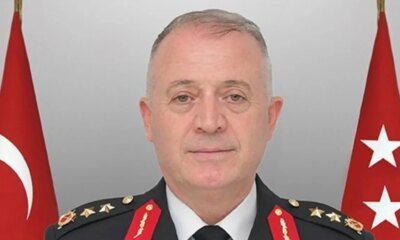
 Daily Agenda1 day ago
Daily Agenda1 day agoIstanbul Provincial Gendarmerie Commander Yusuf Kenan Topcu was promoted to Lieutenant General
-
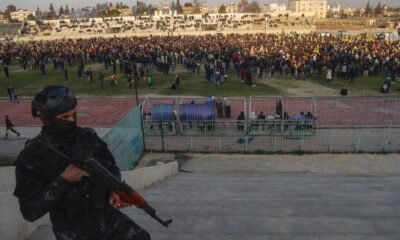
 Politics3 days ago
Politics3 days agoOne state: YPG terrorist group appears bowing to Damascus
-

 Daily Agenda3 days ago
Daily Agenda3 days agoDENSITY FROM DMM to Founded Claims about Bogota Declaration
-
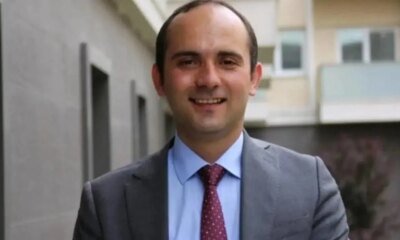
 Daily Agenda1 day ago
Daily Agenda1 day agoTayfun Kahraman’s decision from the AYM: will be re -trial
-
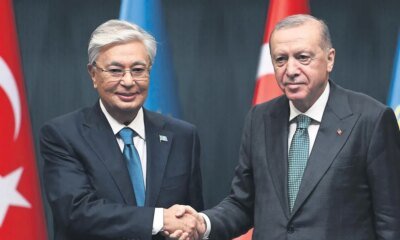
 Daily Agenda3 days ago
Daily Agenda3 days agoIsrael uses hunger as a weapon
-

 Sports2 days ago
Sports2 days agoFenerbahçe enter new era with Chobani’s global sponsorship deal
-
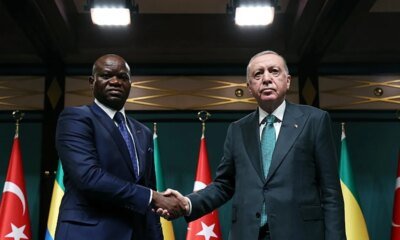
 Daily Agenda1 day ago
Daily Agenda1 day agoGaza message from President Erdoğan: Patience Stone is about to crack
-
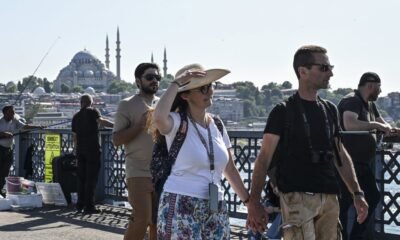
 Economy1 day ago
Economy1 day agoTürkiye’s tourism revenues jump 7.6% to nearly $26B in H1




